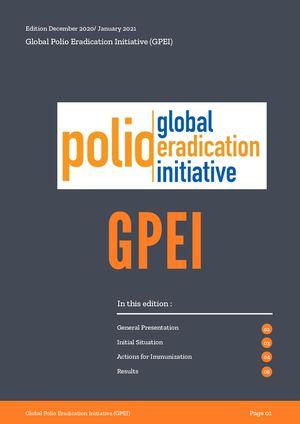Title: Angola Harnesses GPEI’s Established Framework to Combat Cholera Amid Ongoing Polio Eradication Efforts
Angola is demonstrating remarkable ingenuity by repurposing the health infrastructure developed through the Global Polio Eradication Initiative (GPEI) to address a surge in cholera cases. This strategic shift from decades of polio eradication efforts to tackling cholera outbreaks highlights how existing public health systems can be adapted swiftly and effectively to meet new challenges. With a well-established network of trained healthcare workers, community mobilization strategies, and logistical resources originally designed for polio vaccination campaigns, Angola is now applying these assets toward controlling this waterborne disease. This approach not only showcases the versatility of GPEI’s programs but also reflects Angola’s steadfast dedication to protecting its population against evolving infectious threats.
Repurposing Polio Resources: A New Front Against Cholera in Angola
Amid rising cholera outbreaks across various provinces, Angolan health authorities have ingeniously redirected the operational capacity built for polio eradication towards combating this urgent public health issue. The extensive network that once facilitated mass immunization against poliovirus now supports rapid deployment of interventions aimed at preventing and managing cholera infections.
Key elements of this integrated response include:
- Community Engagement Initiatives: Utilizing trusted local volunteers and educators who previously promoted polio vaccines to raise awareness about hygiene practices critical for cholera prevention.
- Mobile Medical Teams: Sending equipped units into hard-to-reach rural areas for prompt diagnosis, treatment, and distribution of oral rehydration solutions.
- Safe Water Programs: Implementing widespread distribution of water purification tablets alongside education on safe water storage methods.
| Main Focus Areas | Tactical Measures Deployed |
|---|---|
| Vaccination Synergy | Coordinating oral cholera vaccine campaigns alongside ongoing polio immunizations. |
| Disease Surveillance Enhancement | Adapting real-time monitoring systems from polio programs to track emerging cholera hotspots efficiently. |
| Capacity Building at Community Level | Cultivating local volunteer networks trained in early detection and response protocols for infectious diseases. |
Building Resilient Health Systems: Insights from GPEI’s Multifaceted Crisis Response in Angola
The success story unfolding in Angola underscores how robust health infrastructures initially created for one disease can be leveraged effectively during other public health emergencies. The Global Polio Eradication Initiative has provided more than just vaccination tools; it has established comprehensive frameworks encompassing workforce training, community trust-building, logistics management, and data analytics—all crucial components when confronting complex outbreaks like cholera.
Angola’s approach includes:
- Spearheading Rapid Deployment Units: Specialized teams ready to respond immediately upon outbreak detection ensure timely containment measures are enacted.
- Culturally Tailored Public Education: Leveraging existing communication channels familiar with local customs enhances message acceptance regarding sanitation and symptom recognition.
- Epidemiological Data Utilization: Employing sophisticated surveillance platforms originally designed for poliovirus tracking enables precise mapping of infection clusters facilitating targeted interventions. li >
Recent data illustrates the impact: regions utilizing GPEI-supported networks reported a 70% decrease in new choleral cases throughout 2023 compared with areas lacking such support (see table below).
| Region th > | Cholera Cases (2023) th > | Percentage Decline (%) th > tr > < /thead > |
|---|---|---|
